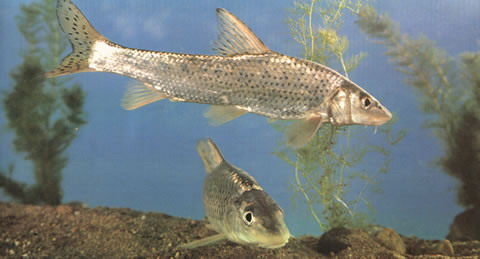| Gobionidae (Gudgeons) |
| 47 cm TL (male/unsexed); 34.3 cm TL (female); max.weight: 1,700.0 g |
|
benthopelagic; freshwater; pH range: 7; dH range: 20 |
| Asia: China, Korea, Japan and Amur River basin. At least one country reports adverse ecological impact after introduction. |
|
Vertebrae: 42-44. Both sides of the body with 7-11 large and blackish spots. Deep body with clearly convex dorsal profile. Head length shorter than body depth. Snout length shorter or equal to postorbital head length. Lips not developed, lateral lobes of lower lip narrow, without folds, the median process large and marked. Barbel length slightly thick, 1/2-2/3 of eye diameter. Dorsal spine strong, equal to HL. Origin of dorsal fin nearer the tip of snout than the caudal base (Ref. 38453). Anal fin with 6 1/2 branched anal rays; last simple dorsal ray ossified, spine-like (Ref. 43281). |
| Adults usually found in streams and creeks with moderate flow and sandy bottom (Ref. 43281). Feed mainly on insects and mollusks in summer and on crustaceans in winter (Ref. 1441) |
|
Least Concern (LC); Date assessed: 06 April 2020 Ref. (130435)
|
| potential pest |
Source and more info: www.fishbase.org. For personal, classroom, and other internal use only. Not for publication.

